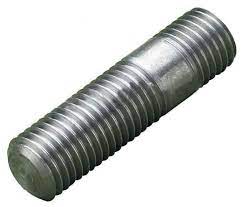Do you ever look at those towering skyscrapers and wonder what keeps things together in the building? Does a bicycle not intrigue you for the same reason? The power tools responsible for holding it all in place are engineering studs. They are simple, screw-like components, but the role they play in our daily lives is vital.
Just imagine a moment what would happen if you didn’t have them in your world – your shelves would sag, maybe your favorite machinery would fall apart, and construction projects would come tumbling down. So, give due credit to these engineering studs champions of stability.
When it comes to anchoring heavy machinery or securing everyday fixtures – their efficiency to hold them in place is unmatched. Let’s find out more about engineering studs and explore their types, uses, and how they function.
Understanding Engineering Studs: Basics, Types, and Applications
This stud bolt is a fastener without a head and has exterior threads on both ends. To securely join the two pieces into a whole, one end must be screwed into the part with an internal thread hole, and the other end must pass through the portion with a through-hole before tightening the nut. It is primarily used in cases where one of the linked pieces is thick, needs a small structure, or cannot be bolted together because it has to be disassembled often.
For different uses and applications, there are several unique stud variants. Learning about the various types, you may choose the ideal stud per your requirements.
- Double End Studs: It features an unthreaded section between the two threaded ends and equal-length threads on both ends to accommodate a nut. They work best when matched with nuts and washers for two connected parts, appropriate for situations where it requires torching from both ends.
- Tap End Studs: These have two ends – a larger thread called the nut end, used to hold a nut, and a shorter thread – the tap end, used to screw into a tapped hole. Tap-end threaded studs are used for unconventional bolting applications.
- Fully Threaded Studs: These are threaded from end to end and are often used to join large parts together, such as flange bolting. These stud bolts are also applied to give machines and constructions an adjustable component.
Furthermore, there are many other kinds, such as saddle, cripple, bonding, clinch, welding, timber, single-end threaded, and locking studs.
The Critical Role of Engineering Studs in Construction and Manufacturing
Engineering Studs are crucial for anchoring a building to its foundation, efficiently securing it to the ground. Part of the bolts are exposed above the surface and are carefully inserted into the masonry or concrete of the foundation. The connection of several structural components, including columns, walls, beams, and machines, to the foundation is made possible by this protruding section. These components increase the overall stability of the building by firmly fastening them to the foundation, reducing the possibility of structural collapse brought on by outside factors like wind, earthquakes, or vibrations.
Another crucial function of engineering studs is equally distributing the weight throughout the foundation. Buildings are subject to various vertical loads, such as the weight of the structure itself, occupants, and the contents within. They assist in distributing these loads, making sure that the foundation is adequately distributed to withstand the pressure generated by the building.
Moreover, stud bolts also provide flexibility during the building process since they may be adjusted and modified as needed. This versatility allows for the required flexibility to handle design changes while also reducing construction problems.
They are also crucial in the maintenance and repair of buildings. Stud bolts make it easier to level and stabilize the structure after foundation damage or settling. Contractors can guarantee the long-term integrity of the structure and correct its alignment by tightening the bolts.
Choosing Royal Hardware to Buy Engineering Studs in Pakistan
If you want to buy engineering studs in Pakistan and you need a reliable source – your go-to place is Royal Hardware. When it comes to securing your projects, we understand the significance of getting suitable stud bolts.
At Royal Hardware, you will find a variety of engineering studs to meet your needs – be it for construction, machinery, or everyday repairs. We provide quality products that you can trust. With Royal Hardware, you won’t have to worry about construction and manufacturing since you can’t compromise on the quality of the components that hold everything together. For top-notch engineering studs, look no further than Royal Hardware.
FAQs:
- What are studs used for in engineering?
Studs are used to securely join two parts, particularly when one of them is thick, requires easy disassembly, or needs structural integrity.
- Does Royal Hardware supply all types of fasteners in Pakistan?
Yes, Royal Hardware offers a wide range of fasteners in Pakistan, meeting diverse construction and manufacturing needs.
Conclusion:
Engineering bolts are an important component of building construction. It provides a secure connection between the structure and its foundation that you can rely on. Stud bolts are essential for maintaining the structural integrity of buildings because they improve stability, distribute loads, resist uplift pressures, and provide flexibility during construction and maintenance. As a reputable company, Royal
Hardware understands the value of these essential parts and adheres to industry best practices to ensure the reliability and safety of any project it works on.

